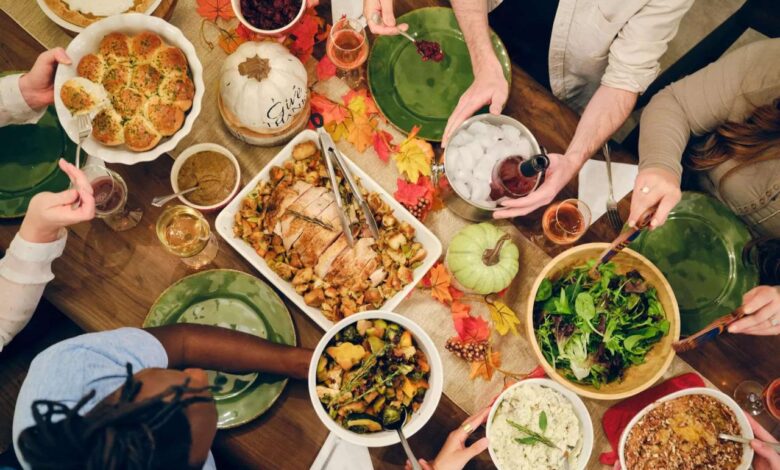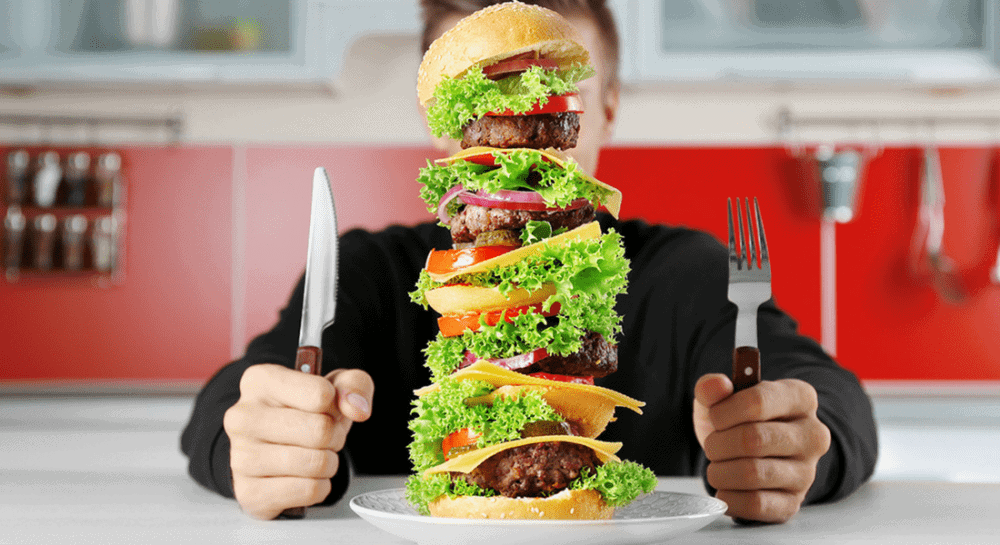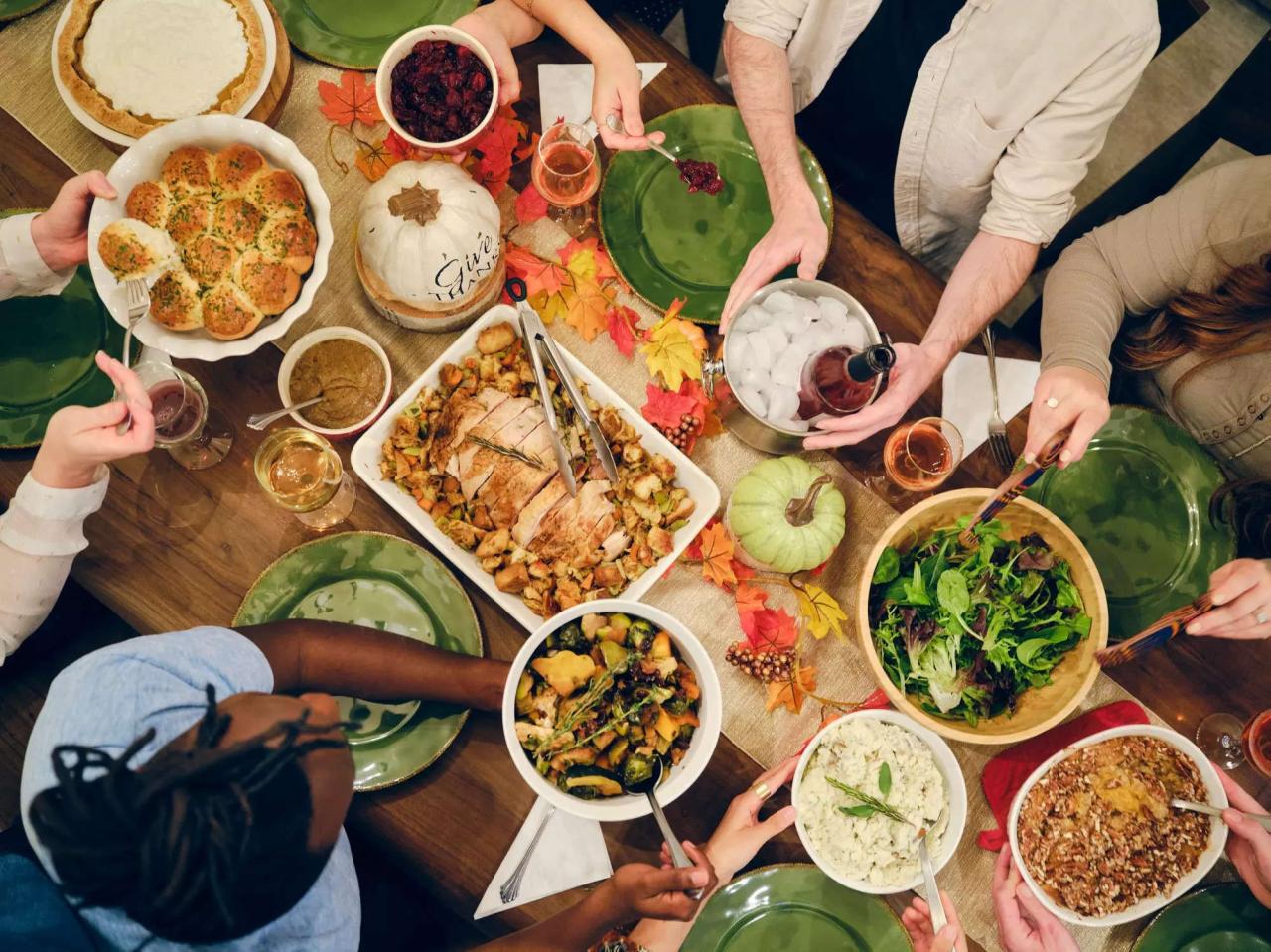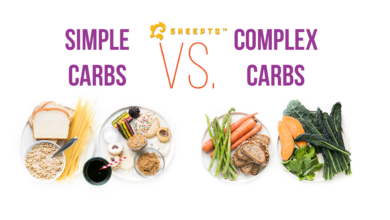
8 Ways to Avoid Overeating on Thanksgiving
8 Ways to Avoid Overeating on Thanksgiving: Thanksgiving is a time for family, friends, and feasting, but it can also be a time for overindulging. If you’re looking to enjoy the holiday without overdoing it, there are a few strategies you can use to avoid overeating.
From starting your day with a healthy breakfast to planning for leftovers, these tips can help you savor every bite without feeling stuffed and regretful later.
By incorporating these strategies into your Thanksgiving Day routine, you can focus on enjoying the company and traditions without letting overeating overshadow the true spirit of the holiday.
Start with a Healthy Breakfast

Thanksgiving is a time for feasting, but it’s also a time to be mindful of your eating habits. Starting your day with a nutritious breakfast can help you avoid overeating later in the day. A healthy breakfast helps regulate your blood sugar levels, which can prevent you from feeling overly hungry and craving unhealthy foods.
A balanced breakfast also provides your body with essential nutrients and energy to start the day, making you less likely to overindulge later.
Examples of Healthy Breakfast Options
A balanced breakfast should include a combination of protein, carbohydrates, and healthy fats. Here are some examples of filling and satisfying breakfast options that can help you stay on track:
- Greek yogurt with fruit and granola: Greek yogurt is a great source of protein and calcium, while fruit provides fiber and vitamins. Granola adds a touch of sweetness and crunch.
- Oatmeal with berries and nuts: Oatmeal is a good source of fiber, which can help you feel full for longer. Berries are packed with antioxidants, and nuts provide healthy fats and protein.
- Eggs with whole-wheat toast and avocado: Eggs are a great source of protein, while whole-wheat toast provides fiber. Avocado adds healthy fats and fiber.
- Smoothie with protein powder, fruits, and vegetables: Smoothies are a quick and easy way to get a nutritious breakfast. Choose protein powder, fruits, and vegetables that are low in sugar.
Hydrate Throughout the Day: 8 Ways To Avoid Overeating On Thanksgiving
Staying hydrated is crucial for overall health and well-being, especially during Thanksgiving when you’re likely to indulge in a feast. Water plays a vital role in satiety, helping you feel full and satisfied, which can prevent overeating.
The Role of Water in Satiety
Water helps you feel full by expanding your stomach, which sends signals to your brain that you’ve eaten enough. This can be especially helpful when you’re surrounded by tempting foods. Drinking water before, during, and after your Thanksgiving meal can help you feel fuller faster and prevent overindulging.
Tips for Staying Hydrated on Thanksgiving
- Drink water before your meal.Start your Thanksgiving day by drinking a glass of water. This will help you feel fuller and less likely to overeat.
- Have a glass of water between courses.Don’t wait until you’re thirsty to drink. Sip water between courses to help you feel satisfied and prevent overeating.
- Choose water over sugary drinks.Sugary drinks like soda and juice can contribute to overeating and dehydration. Opt for water or unsweetened beverages instead.
- Keep a water bottle handy.Having a water bottle readily available will encourage you to stay hydrated throughout the day.
Mindful Eating

Thanksgiving is a time for feasting, but it’s easy to get carried away and overeat. Mindful eating is a powerful tool for preventing overindulgence. It involves paying attention to your hunger cues and eating slowly, allowing your body to register fullness.
Strategies for Mindful Eating
Mindful eating is a practice that involves paying attention to your food and your body’s signals. It’s about being present in the moment and savoring each bite. Here are some strategies to practice mindful eating during a Thanksgiving feast:
- Take a few deep breaths before you start eating.This will help you relax and focus on the present moment.
- Choose a quiet spot to eat.Avoid distractions like television or conversations.
- Put down your fork between bites.This will help you slow down and savor each bite.
- Chew your food thoroughly.This will help you digest your food better and feel more satisfied.
- Pay attention to your hunger and fullness cues.Eat until you’re comfortably full, not stuffed.
- Enjoy the flavors and textures of your food.Don’t rush through your meal.
Portion Control
Portion control is a powerful strategy for avoiding overeating on Thanksgiving. Instead of piling your plate high, focus on enjoying a balanced and satisfying meal by understanding appropriate serving sizes.
Thanksgiving is all about delicious food, but it’s easy to overindulge. To help you stay on track, I’ve got a simple tip: Get your blood pumping before the feast with a quick workout! Try your 9 minute total body bodyweight workout , it’s a great way to burn some calories and feel energized.
Then, you’ll be ready to enjoy all the Thanksgiving goodness without feeling guilty about second helpings!
Recommended Portion Sizes
This table provides a guideline for recommended portion sizes for popular Thanksgiving dishes:
| Dish | Recommended Portion Size |
|---|---|
| Turkey | 3-4 ounces |
| Stuffing | 1/2 cup |
| Mashed Potatoes | 1/2 cup |
| Gravy | 2 tablespoons |
| Dessert | 1/2 cup |
Tips for Using Smaller Plates and Avoiding Seconds, 8 ways to avoid overeating on thanksgiving
Smaller plates can help you visually perceive a smaller portion, making it easier to avoid overeating. Here are some helpful tips:
- Use a salad plate instead of a dinner plate.
- Fill half of your plate with vegetables and lean protein, and the other half with starches.
- Take small bites and savor each mouthful.
- Avoid seconds unless you’re truly still hungry.
- Drink water between bites to help you feel full.
Choose Healthy Options
Thanksgiving is known for its delicious but often calorie-laden dishes. However, you can still enjoy the holiday feast without overindulging by making healthier choices. This means opting for dishes that are lower in calories, fat, and sodium while still satisfying your taste buds.
Healthy Alternatives
Making healthier choices doesn’t mean sacrificing flavor. You can enjoy traditional Thanksgiving dishes with a few simple swaps. Here are some examples:
- Instead of fried turkey, try roasting it with herbs and spices. Roasting allows the turkey to cook in its own juices, resulting in a moist and flavorful bird. It also eliminates the added calories and fat from frying.
- Replace mashed potatoes with mashed sweet potatoes or butternut squash. Sweet potatoes and butternut squash are naturally sweeter than potatoes and offer a good source of fiber and vitamins. You can also make them with less butter and cream for a healthier version.
- Swap out traditional gravy for a lighter version made with low-sodium chicken broth and cornstarch. You can also add herbs and spices to enhance the flavor without adding extra calories.
- Choose whole-wheat bread for stuffing and cranberry sauce. Whole-wheat bread is a good source of fiber and nutrients compared to white bread. It adds a heartier texture to the stuffing while keeping it light.
- Instead of heavy desserts like pumpkin pie, opt for lighter options like fruit salad or a small piece of dark chocolate. Fruit salad is a refreshing and healthy dessert that provides essential vitamins and antioxidants. Dark chocolate is a good source of antioxidants and can be enjoyed in moderation.
Recipe Ideas
Here are a few recipes that are lower in calories and fat while still delicious:
- Roasted Turkey with Herb Butter:This recipe features a flavorful roasted turkey with a simple herb butter. The herb butter adds a burst of flavor without being overly rich. The turkey is roasted in its own juices, resulting in a moist and tender bird.
Thanksgiving is all about enjoying delicious food with loved ones, but it can be easy to overindulge. One way to help avoid overeating is to create a visually appealing table that inspires mindful eating. Check out this article for 5 ways to fill your thanksgiving table with color and make your feast more enjoyable.
With a colorful table, you’ll be more likely to savor each bite and appreciate the beauty of the food, which can help you eat more consciously and avoid overeating.
Ingredients:
- 1 (12-14 pound) turkey
- 1/2 cup unsalted butter, softened
- 1 tablespoon chopped fresh rosemary
- 1 tablespoon chopped fresh thyme
- 1 tablespoon chopped fresh sage
- 1 teaspoon salt
- 1/2 teaspoon black pepper
Instructions:
Thanksgiving is a time for indulging, but overeating can leave you feeling sluggish and regretful. To avoid that, try these tips: eat a balanced meal, fill up on vegetables, and drink plenty of water. But remember, even registered dietitians struggle with food choices! Read this article 3 surprising takeaways about being a registered dietitian for a peek into their world.
And don’t forget, the key to a successful Thanksgiving is moderation and enjoying the company of loved ones. So, relax, savor the moment, and let the food be a delightful part of your celebration.
- Preheat oven to 325 degrees F (165 degrees C). Rinse turkey inside and out. Pat dry with paper towels. Place turkey in a roasting pan.
- In a small bowl, combine butter, rosemary, thyme, sage, salt, and pepper. Rub herb butter all over the turkey.
- Roast turkey for 3-4 hours, or until a meat thermometer inserted into the thickest part of the thigh registers 165 degrees F (74 degrees C). Let turkey rest for 15 minutes before carving.
- Mashed Sweet Potatoes with Cinnamon and Ginger:This recipe features a flavorful and healthy twist on traditional mashed potatoes. The sweet potatoes are mashed with a touch of cinnamon and ginger for a warm and comforting flavor.
Ingredients:
- 2 pounds sweet potatoes, peeled and cubed
- 1/4 cup unsweetened almond milk
- 1 tablespoon olive oil
- 1 teaspoon ground cinnamon
- 1/2 teaspoon ground ginger
- 1/4 teaspoon salt
- 1/4 teaspoon black pepper
Instructions:
- Preheat oven to 400 degrees F (200 degrees C). Place sweet potatoes in a baking dish. Drizzle with olive oil and toss to coat. Season with cinnamon, ginger, salt, and pepper.
- Roast sweet potatoes for 25-30 minutes, or until tender. Transfer to a food processor or bowl and mash until smooth. Add almond milk and continue mashing until desired consistency is reached.
Move Your Body
Thanksgiving is a day for feasting, but it’s also a day to be active. Getting your body moving can help regulate your appetite and burn calories, making it easier to stay within your eating goals.
Incorporating Movement into Thanksgiving Day
Physical activity can help regulate appetite and burn calories. When you exercise, your body releases endorphins, which have mood-boosting effects and can help reduce cravings. Exercise also helps to increase your metabolism, which means your body burns more calories even when you’re at rest.Here are some ways to incorporate movement into Thanksgiving Day:
- Take a walk after dinner. A brisk walk after a big meal can help with digestion and burn some extra calories. It’s also a great opportunity to enjoy the crisp autumn air and spend time with family and friends.
- Play some outdoor games. Get everyone involved in a friendly game of football, frisbee, or tag. These activities are a fun way to burn calories and create lasting memories.
- Go for a hike. If you’re near a park or wooded area, take advantage of the beautiful fall foliage and go for a hike. This is a great way to get some exercise and enjoy the outdoors.
Plan for Leftovers

Thanksgiving is a time for delicious food, family, and friends. But with all the feasting, it’s easy to overeat, especially the day after. The key to enjoying Thanksgiving without overindulging is to plan ahead for leftovers. By strategically managing your leftovers, you can enjoy delicious meals without the guilt of overeating.
Managing Leftovers to Prevent Overeating
To prevent overeating the day after Thanksgiving, it’s essential to have a plan for your leftovers. Here are a few strategies:* Portion Control:Instead of serving yourself a heaping plate of turkey and stuffing, portion out smaller, more manageable servings. This helps prevent overeating and ensures you have enough leftovers for later.
Refrigerate Quickly Store leftovers in the refrigerator as soon as possible after the meal. This helps prevent bacteria growth and ensures the food stays fresh for longer.
Freeze Leftovers If you have more leftovers than you can eat within a few days, freeze them for later use. This extends the shelf life of the food and allows you to enjoy Thanksgiving flavors throughout the week.
Repurpose Leftovers Get creative with your leftovers and find new ways to enjoy them. Instead of reheating the same dishes, transform them into new meals.
Eat Mindfully When enjoying leftovers, focus on each bite and savor the flavors. Pay attention to your hunger cues and stop eating when you feel satisfied.
Creative Leftover Recipe Ideas
Here are some ideas for turning your Thanksgiving leftovers into delicious and healthy meals:
| Leftover Dish | Creative Recipe Idea |
|---|---|
| Turkey | Turkey salad sandwiches, turkey chili, turkey soup, turkey pot pie |
| Stuffing | Stuffing casserole, stuffing muffins, stuffing fritters |
| Mashed Potatoes | Potato soup, potato pancakes, potato croquettes |
| Cranberry Sauce | Cranberry sauce pancakes, cranberry sauce muffins, cranberry sauce glaze for pork |
| Green Bean Casserole | Green bean casserole salad, green bean casserole frittata |
Final Conclusion
Remember, Thanksgiving is a time to celebrate with loved ones and enjoy delicious food. By following these tips, you can navigate the feast with mindful eating, portion control, and a focus on enjoying the moment. So, relax, indulge in moderation, and cherish the company and the spirit of the holiday.
Happy Thanksgiving!






